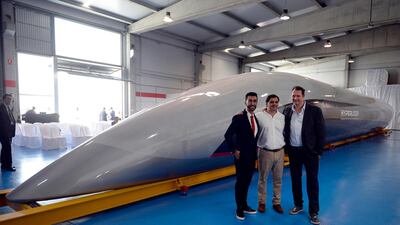California-based Hyperloop Transportation Technologies (HTT), which is aiming to develop the Middle East’s first hyperloop line running over five-kilometres in Abu Dhabi by 2020, is also exploring potentially viable routes in Saudi Arabia.
"We are talking to Saudi Arabia government and there are couple of very interesting projects [we are considering] right now," Bibop Gresta, chairman and co-founder of HTT, told The National.
“However, there are several routes that we are currently studying in the kingdom in terms of long-term feasibility. Once our studies are done, we will select those routes that will prove more strategic for hyperloop development,” said Mr Gresta.
HTT will face a stiff competition from Virgin Hyperloop One, a DP World-backed company headed by British tycoon Richard Branson that is developing the futuristic transport concept first dreamed up by Tesla and SpaceX chief Elon Musk. Saudi Arabia’s Crown Prince Mohammed bin Salman unveiled Virgin Hyperloop One’s proposed transit pod for a Vision 2030 Hyperloop system earlier this year.
According to estimates of Virgin Hyperloop One, technology could shrink journey times between Riyadh and Jeddah to 76 minutes from nearly 10 hours currently while travelling from Riyadh to Abu Dhabi would take less than 60 minutes compared to over eight hours today.
HTT has signed an agreement with Aldar to establish a commercial line in Al Ghadeer on the border of Abu Dhabi, with the goal to extend the line to Abu Dhabi airport in the future, passing through Ferrari World. The first 5km is slated to be completed by the start of Expo-2020.
“It will be a demonstration track that will attract tourists. We are counting to have millions of tourists from the expo to visit our facility,” said Mr Gresta.
“However, if we are capable of meeting the regulations in time, they [tourists] will be able to ride it as well. Certification and regulation are the main priorities because infrastructure needs to be safe.”
HTT is working in partnership with entities such as Aldar Properties, Khalifa University, Petroleum Institute and Masdar for this project.
“We already have a presence in Abu Dhabi … from here we can expand and create a GCC-wide network,” said Mr Gresta.
______________
Read more:
Abu Dhabi set for moment in Hyperloop history
First Hyperloop TT passenger pod unveiled in Spain
______________
Regarding costs involved in building a hyperloop system, Mr Gresta said they vary depending on where they are to be situated, but "in general, there could be an expenditure of $20 million to $40m per kilometre".
"But the main question in hyperloop industry is not the cost but how many years will it take to recover [the outlay],” he said, adding: “Recovery time could be 11 to 15 years, but in countries like India, where you have more density of population, this time frame could be less.”
In a bid to create a global regulatory framework for hyperloop operations, HTT held a meeting in September under the supervision of Munich-headquartered TUV SUD, one of the world's leading technical service providers of testing and product certification.
“We are working to formulate a framework ... The Munich meeting was a strong step towards the commercialisation of hyperloop systems in the world,” said Mr Gresta.
The meeting was attended by HTT’s 11 stakeholder nations, including the UAE, India, China, the US, Ukraine, Brazil and France.
HTT was also commissioned by Abu Dhabi’s Department of Transport to study the feasibility of building a hyperloop line between Al Ain and the capital.
“This study was not only from the technology and practicality point of view but from the economic aspect … on a route where you don’t expect many people to be travelling. It was an exercise to understand how these two cities will be changed by having a hyperloop,” Mr Gresta said.
The 145km between Abu Dhabi and Al Ain could be covered in around 12 minutes via hyperloop, it is estimated.



